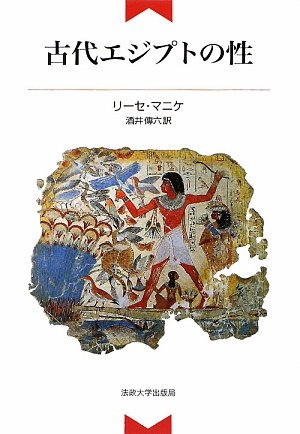旧版
"Sexual Life in Ancient Egypt"(1987 Lise Manniche)の日本語版です。わたしがもっているのは旧版です。新装版が出たのが2009年。訳者はもう亡くなっていますね。ということは、装丁は新しいけど、訳は変っていないということでしょうか。
図版が多いのですが、旧版では白黒です。新装版はどうなのでしょう。ぜひ、鮮明なカラーで掲載してほしいですが、これだけの図版を載せるとすれば、相当高額な本になるでしょうね。
私の考古学史
当時はテレビも映画も当り前の存在じゃなかったので、多分本を見てエジプトに憧れました。吉村作治先生とかが雑誌でピラミッドなんかの紹介をしているのをワクワクしながら読みました。「トロイの木馬」の話はとても面白かったし、「自分が「マヤ文字」を解読しよう」とも思っていました。その後はどちらかというと科学少年でしたが、インディー・ジョーンズがその気持を呼び覚ましましたね。
「ロマンと現実」のように思っていた、「歴史と科学」が今はとても親和性があるものだと感じています。
ヒエログラフを読む
古代エジプトの文献は、パピルスにヒエログラフで書かれていました。それを読むというのはどういうことでしょう。
山本哲士さんはYoutubeで「言語で読まなければわからない」と言っていました。私も同感です。でも日本語しか読めない私には無理な注文です。
現在のエジプト[wiki(JP)]の公用語はアラビア語です。エジプト語(コプト語)を話す人は殆どいません。この本の著者はデンマーク生まれで、この本は英語で書かれています。私は日本語で読んでいるのですが、それは古代エジプトの人が書いた意図とどれくらい違うのでしょうか。著者が、イギリス文化で解釈し、訳者がそれを日本語文化で翻訳したものです。それは近代以降の西洋の「見方」が入っていないでしょうか。
掲載されているエロチックな図版に描かれているペニスは、とても大きいです。でもそれは、古代エジプト人が大きなペニスをもっていた証拠にはなりません。
歴史
古代エジプト文字はナポレオンがフランスに持ち帰ったロゼッタストーン[wiki(JP)]によって、シャンポリオンが解読したものです。19世紀初頭の話です。ピラミッドは、5000年の間変わらずに存在していますが、古代エジプトの文化は近代に再発見されました。それは「歴史」の再発見であるとともに、近代歴史学の成立です。
歴史(ギリシア語: ιστορία)はヘロドトス(古希: Ἡρόδοτος、紀元前5世紀)に始まったと言われますが、それは近代に再発見、あるいは作られたのです。この本もヘロドトスの引用から始まります。
「歴史」という漢字は司馬遷[wiki(JP)]の史記[wiki(JP)](BC100年頃?)に依っています。
ですから、西洋における歴史というのは、近代社会が生み出したもので、近代西洋人が西洋文化の中で過去を再解釈したものです。
別の文化で解釈すること
アイヌ語で
tanpe e=kore kusu ne na.(『アイヌ語入門』中川裕著 P.71)は直訳すると「これをあなたはあげるでしょう」ですが、「これをあげなさい」という意味だそうです。直訳だと、なんか「予言的」な意味ですよね。日本語でも「廊下は静かに」という張り紙が、「廊下では静かにしなさい」という意味ですよね。直訳は真実を伝えるとは限らないのです。言語は使われるものです。あるものが持つ意味は、時代と社会によって、つまり文化によって違うのです。
文化が違えば、「見え方」も異なります。パピルスに書かれている絵は平面的です。現代のひとはそれを見て、「子供の絵のように拙い」と思うかもしれません。古代エジプトの歴史は長いですが、一部は古典ギリシアの時代と重なります。古典ギリシア時代の彫刻は見事ですよね。別に当時のエジプトの絵画の技術が劣っていたわけではありません。中世のヨーロッパ絵画は平面的でどこか、パピルスの絵と似ている気がします。日本の絵画も近代までは平面的ですよね。たぶん、「写真」のように描くより、そのほうが深い意味を表せたと思うし、それはその当時の人には「そのように見えていた」のだと思います。現在だって、細密画のみが「真実」を表しているとは考えられていないし、「真実」以上のフェイク動画(あるいはフェイクニュース)もあるのです。
外国語、歴史を読むということ
たとえば、
わが兄は今宵わたしを見つめるだろう。(P.149)
というパピルスの文章があります。「兄」は恋人の意味だそうですが、「愛しい人よ、わたしを見つめなさい(てください)」という嘆願、あるいは命令の意味じゃないとどうして言い切れるのでしょうか。聖書にもこういった「予言的な」文章は多いですよね。
外国語、あるいは歴史的な文書を読むということは、現在の自分の生きている社会における「解釈」以外が可能なのでしょうか。現在の自分の生きている社会で認識できないような(想像もできないような)解釈は不可能だと思います。古代エジプト文字「ヒエログラフ」は表音文字と、表意文字が混ざっています(日本語も、中国語もそうですね)。それがヒエログラフの解読を困難にし、かつ助けたと思います。でも、文字がない文化や音声のない文化、たとえばアイヌ語や手話(ノンバーバルな言語)は歴史を作れるでしょうか。
たとえ、原語で読んだとしても、翻訳で読んだとしても、他の「言語」を、つまり、「他の世界観」を理解することが可能でしょうか。The Beatlesの「Love me do」を日本語にすることは可能でしょうか。
可能性
それは、「他の人」を理解することの可能性の問題と同じだと思います。可能だとすれば「翻訳」や「失われた言語の解読」も可能です。「歴史」が成り立つかどうか(歴史の可能性)、はこのことと密接に関わっています。それは、歴史を語ることの傲慢が許されるかどうか、ということです。
私は、他人の心、他の文化、他の世界観を知ることは、可能でもあり不可能でもあると思っています。わたしたちは「他者」とともに社会を作っているし、生きています。「論理」は通用しません。論理は「自然の理」ではなくて、「言葉の理」「社会の理」「文化の理」だからです。それに対する「自然の理」は「倫理」でしょうか。
知り合える、理解できるとすれば、それは言葉を超えた同じ感覚、共通の肉体感覚、それに基づく感情の共有だと思います。「痛い」「嬉しい」「気持ちいい」「愛してる」「恋しい」・・・笑ったり、泣いたりする体の動きです。ただ、何が気持ちいいか、誰を愛するのか・・・などは社会に影響されますよね。何が気持ちいいか、誰を愛するのか、などは自分でもわからないことが多いです。やってみたら気持ちよかった、気がついたら好きになっていた、とか。
「ここまでは自然でここからは社会」「ここまでは倫理でここからは論理」というような境目は存在しないでしょう。人間にとっては社会も自然の一部ですから。たぶん、自然から社会を切り離し、社会から自分を切り離す思考方法に、その「不可能性」の原因はあるんだと思います。他者を語る傲慢さ、主体(主語)を語る偏狭さ、少なくとも、「可能性」だけを語る「傲慢」には陥ってはいけないのではないかと思っています。男女間だけでなく、親子間でも。
Old version
This is the Japanese version of "Sexual Life in Ancient Egypt" (1987 Lise Manniche). I have an old version. The new edition was released in 2009. The translator is dead. Does that mean that the binding is new, but the translation hasn't changed?
There are many illustrations, but the old version is black and white. How about the new edition? I really want you to publish it in vivid colors, but if you put so many illustrations on it, it would be a fairly expensive book.
My history of archeology
At that time, neither TV nor movies were commonplace, so I probably saw books and longed for Egypt. I was excited to read that Sakuji Yoshimura introduced a pyramid in a magazine. The story of "Trojan horse" was very interesting, and I thought "I will decipher" Maya script "." After that, I was rather a science boy, but Indiana Jones awakened that feeling.
She thought "romance and reality", but now "history and science" feels very compatible.
Read hieroglyphs
Ancient Egyptian literature was written in hieroglyphs on papyrus. What does it mean to read it?
Tetsuji Yamamoto said on Youtube, "I don't know unless I read it in a language." I feel the same way. However, it is an impossible order for me who can only read Japanese.
The current official language of Egypt[wiki(JP)] is Arabic. Few people speak Egyptian (Coptic). The author of this book was born in Denmark and this book is written in English. I read in Japanese, but how different is it from the intentions written by the ancient Egyptians? The author interpreted it in British culture and the translator translated it in Japanese culture. Doesn't it contain the Western "view" since modern times?
The penis depicted in the erotic illustrations posted is very large. But that is not evidence that the ancient Egyptians had a large penis.
History
The ancient Egyptian characters were deciphered by Champollion by the Rosetta Stone[wiki(JP)] that Napoleon brought back to France. This is the story of the early 19th century. The pyramids have remained unchanged for 5,000 years, but ancient Egyptian culture has been rediscovered in modern times. It is the rediscovery of "history" and the establishment of modern history.
History (Greek: ιστορία) is said to have started in Herodotus (Ancient: Ἡρόδοτος, 5th century BC), but it was rediscovered or created in modern times. This book also begins with a quote from Herodotus.
The Chinese character "history" is based on History[wiki(JP)] (around 100 BC?) Of Sima Qian[wiki(JP)].
Therefore, history in the West was created by modern society and is a reinterpretation of the past in Western culture by modern Westerners.
Interpreting in another culture
In Ainu
tanpe e = kore kusu ne na. ("Introduction to Ainu" by Hiroshi Nakagawa P. 71) literally translates to "you will give this", but it means "give this". A literal translation means something "prophetic", isn't it? Even in Japanese, the poster saying "Be quiet in the corridor" means "Be quiet in the corridor." A literal translation does not always tell the truth. The language is what is used. The meaning of something depends on the times and society, that is, on culture.
Different cultures have different "looks". The picture on the papyrus is flat. Modern people may see it and think, "It's as poor as a child's picture." Ancient Egypt has a long history, but partly overlaps with the classical Greek era. The sculptures of the classical Greek era are wonderful. Apart from that, Egyptian painting techniques at that time were not inferior. Medieval European paintings are flat and somehow similar to papyrus paintings. Japanese paintings are flat until modern times, aren't they? Perhaps it could have a deeper meaning than drawing it like a "photograph", and I think it "looked like that" to people at that time. Even now, miniatures are not considered to represent the "truth" alone, and there are fake videos (or fake news) that are more than "truth".
Reading foreign languages and history
for example,
My brother will look at me tonight. (P.149)
There is a papyrus sentence. It seems that "brother" means a lover, but how can you say that it does not mean a plea or a command to "look at me, dear one"? There are many such "prophetic" sentences in the Bible.
Is reading a foreign language or historical document possible other than the "interpretation" of the society in which I live today? I don't think it's possible to make an unrecognizable (unimaginable) interpretation in the current society in which you live. The ancient Egyptian hieroglyphs are a mixture of phonetic and ideographic characters (both Japanese and Chinese). I think it made it difficult and helped to decipher the hieroglyphs. But can cultures without letters and sounds, such as Ainu and sign language (nonverbal languages), make history?
Is it possible to understand other "languages", that is, "other worldviews", whether read in the original language or in translation? Is it possible to translate "Love me do" from The Beatles into Japanese?
Possibility
I think it's the same as the question of the possibility of understanding "others". If possible, "translation" and "decoding the lost language" are also possible. Whether or not "history" holds (the possibility of history) is closely related to this. That is whether the arrogance of telling history is allowed.
I think it is possible and impossible to know the minds of others, other cultures, and other worldviews. We are creating and living a society with "others". "Logic" does not work. This is because logic is not "natural reason" but "word reason", "social reason", and "cultural reason". Is the "natural reason" for it "ethics"?
If you can get to know and understand, I think it is the same feeling that transcends words, the common physical feeling, and the sharing of emotions based on it. "It hurts," "I'm happy," "It feels good," "I love you," "I miss you," ... It's the movement of your body that makes you laugh and cry. However, what makes you feel good, who you love, etc. are influenced by society. Often I don't even know what feels good or who I love. It felt good when I tried it, and when I realized it, I liked it.
There will be no boundaries such as "natural up to here and society from here" and "ethics up to here and logic from here". For humans, society is also a part of nature. Perhaps the cause of that "impossible" lies in the way of thinking that separates society from nature and oneself from society. I think we should not fall into the arrogance of talking about others, the narrowness of talking about the subject (subject), or at least the "arrogance" of talking only about "potential." Not only between men and women, but also between parents and children.
[著者等(プロフィール)]
マニケ,リーセ
デンマーク生まれの女流エジプト学者。1981年以来、イギリスに定住して研究を続け、頻繁にエジプトへ出向いて現地調査も行なっている
酒井/傳六
1921年、新潟県に生まれる。東京外国語学校仏語部卒業。1955‐57年、朝日新聞特派員としてエジプトに滞在。その後は日本オリエント学会会員として古代エジプトの研究と著述に従事。1991年8月17日逝去
目次
概説(性に対するエジプト人の態度;売春;内妻と姦通;同性愛;動物との性交;屍姦;近親相姦;一夫多妻;性生活における他の諸相;言葉と図像のエロチックな表現;愛の道具)
エロチックな文章(神話の物語;人間の物語;愛の詩;知恵文書;暦と夢の書;魔法文書;エロチックな戯画)
終章
〈書抜〉
「彼らが人間の交接している情景で墓を飾ることをあえてしなかったのは、たぶん、見た目に美しいかどうかということと関係はなかった。むしろこれは、いかなる絵図にも内在する魔法の力が制御不能になるおそれがあって、性的な事柄が関係している時はいかなる場合にもそれは恐ろしくかつ有害になる、という確固とした信念に根ざすものであった。」(P.72)
「この最後の美しい点を鑑賞するためには、エジプト人が女性の体の一部を衣服でかくしていることに魅惑されたということを知っておかねばならない。彼らは全裸または半裸の人々をまわりに見るのに非常に慣れていたので、このような姿はその惹きつける力と神秘的な魅力を失ってい(FF)た。しかし、湿り気のある、身体に密着した、半透明の、上質リネンの衣服をまとった女性は、彼らの想像力を刺激した。」(P.174-175)
「その時、私は[彼女の衣服]を着て見せびらかし、(LF)(FF)彼女の身体に近づくだろう。(LF)私は彼女の衣服から香油を洗い落とし、(LF)彼女の衣服の中で・・・わが身を洗うだろう。」(P.179-179)__フェチ
「他の初期の、いわゆる原始文明と同じように、エロチックな事柄は第一義性をもち、したがって生活の不可欠部分となった。」(P.227)__「なった」んじゃなくて、もともとそういうもの。それをことさら協調する文化、エロチックであることを強制される文化、こそを問題提起しなければならない。著者の関心、筆使いこそがそれを表している。
「われわれが古代民族の生活に親密に触れるのは、あらゆる時代のあらゆる人びとに共通の人間の基本的欲求を通してなのである。」(P.229)



